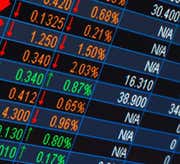
|
It's important to note that futures trading is not for everyone. While futures can be used to hedge other investments, they are also used for speculation – which carries the potential for both large rewards and large losses because of leverage. Before trading futures, it’s important to do your homework so you know what you’re doing: As a futures trader, you should have a solid understanding of how the market and contracts function. You'll also need to determine how much time, attention, and research you can dedicate to the investment. Talk to your broker and ask questions before opening a futures account. (For more, see How to Start Trading.)
It’s also important to understand the risks – and to be absolutely certain that you’re financially and emotionally ready to accept any financial losses. Keep in mind, leveraged losses can wipe out a trading account in a matter of minutes. In general, futures traders are advised to only use funds that are earmarked as pure risk capital – that is, money you can truly afford to lose.
Once you've made the initial decision to enter the futures market, there are a few different approaches to consider:
Do It Yourself
As an investor, you can trade your own account without the aid or advice of a broker. This involves the most risk because you become responsible for managing funds, ordering trades, maintaining margins, acquiring research and coming up with your own analysis of how the market will move in relation to the commodity or underlying financial instrument in which you've invested. It requires time and complete attention to the market. (For related reading, see Introduction to Order Types.)
Open a Managed Account
Another way to participate in the market is by opening a managed account, similar to an equity account. Your broker would have the power to trade on your behalf, following conditions agreed upon when the account was opened. This method could lessen your financial risk because a professional would be making informed decisions on your behalf. However, you’d still be responsible for any losses incurred, as well as for margin calls. Note that you'd probably have to pay a management fee for the service.
Join a Commodity Pool
A third way to enter the market, and one that offers the smallest risk, is to join a commodity pool – an enterprise in which funds contributed by a group of investors are combined for the purpose of trading futures (or options on futures, retail off-exchange forex contracts or swaps). Your profits and losses are directly proportionate to the amount of money you invest. By entering a commodity pool, you also gain the opportunity to invest in diverse types of commodities. You are also not subject to margin calls. However, it is essential that the pool be managed by a skilled broker, because the risks of the futures market are still present in the commodity pool.
Futures Fundamentals: Conclusion
-
.jpg?quality=60&width=180&height=120) Trading
TradingUnderstanding Forex Risk Management
There's risk in every trade you take, but as long as you can measure risk, you can manage it. -
 Investing
InvestingSwimming Pools: Costs Vs. Long-Term Value
Consider the costs of installing and maintaining a swimming pool, and compare this with the pool's utility and the market value it adds to your home. -
 Trading
TradingForex Basics: Setting Up An Account
The line between profitable forex trading and ending up in the red may be as simple as choosing the right account. -
 Investing
InvestingRisk Tolerance and Your Personal Portfolio
To best manage your investment portfolio over the years, you need to determine your risk tolerance. How much risk you are willing to take? -
 Trading
Trading10 ways to avoid losing money in forex
When approached as a business, forex trading can be profitable and rewarding. Find out what you need to do to avoid big losses as a beginner. -
 Investing
InvestingHow to Choose a Forex Broker: Everything You Need to Know
Take your time when looking for a forex broker because a bad decision can be costly. -
 IPF - Broker
IPF - BrokerThe Complete Guide to Choosing an Online Stock Broker
Online stock brokers have made high-risk, high-reward investing available to the broader public. -
 Trading
TradingIs your forex broker a scam?
While the forex market is slowly becoming more regulated, there are many unscrupulous brokers who should not be in business.


